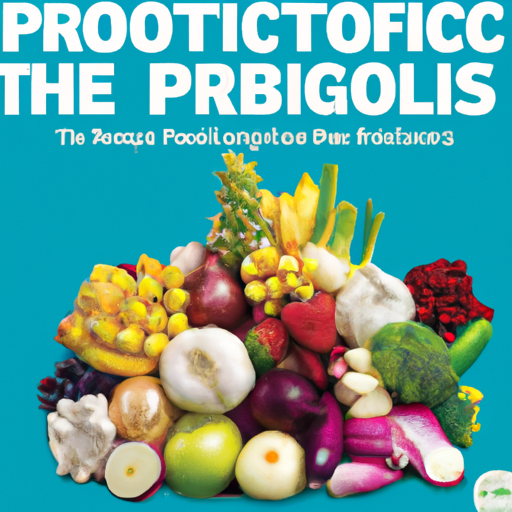You may have heard about prebiotics in supplements, but do you really know what they are? In this article, we will take a closer look at these mysterious substances and uncover their role in promoting gut health and overall well-being. Get ready to discover the power of prebiotics and how they support a thriving microbial community in your digestive system. So, let’s dive in and explore the fascinating world of prebiotics in supplements!

This image is property of images.unsplash.com.
Definition of Prebiotics
Basic definition of Prebiotics
Prebiotics are a type of dietary fiber that cannot be digested by the human body. They are essentially food for the beneficial bacteria that reside in your gut. Prebiotics work by stimulating the growth and activity of these beneficial bacteria, which can have a positive impact on your overall health and well-being.
Difference between prebiotics and probiotics
While prebiotics and probiotics are both beneficial for gut health, they are different in their nature and function. Prebiotics are non-living substances that provide nourishment to the good bacteria in your gut, while probiotics are live microorganisms (such as bacteria or yeast) that directly add beneficial bacteria to your gut. In other words, prebiotics feed the good bacteria, while probiotics introduce new bacteria to your gut.
Forms of Prebiotics
Common types of Prebiotics
Some of the most common types of prebiotics include inulin, fructooligosaccharides (FOS), galactooligosaccharides (GOS), and xylooligosaccharides (XOS). These prebiotics are widely used due to their ability to promote the growth of beneficial bacteria and their overall effectiveness in maintaining gut health.
Natural sources of Prebiotics
Prebiotics can be naturally found in a variety of foods. Some of the best natural sources of prebiotics include bananas, onions, garlic, leeks, asparagus, chicory root, and whole grains. Including these foods in your diet can help ensure a good intake of prebiotics and support the growth of beneficial gut bacteria.
Synthetic sources of Prebiotics
In addition to natural sources, prebiotics can also be synthetically produced and incorporated into various supplements. Synthetic prebiotics, such as inulin and fructooligosaccharides, offer a convenient way to ensure an adequate intake of prebiotics when natural sources may not be readily available or suitable for certain individuals.
Prebiotics in Supplements
Why prebiotics are used in supplements
Prebiotics are often included in dietary supplements to provide additional support to your gut health. By including prebiotics in supplements, manufacturers aim to promote the growth of beneficial bacteria and enhance the overall effectiveness of the product. This allows individuals to conveniently supplement their prebiotic intake and optimize their gut health.
Different kinds of supplements containing prebiotics
There are various types of supplements that contain prebiotics, offering individuals different options to incorporate prebiotics into their daily routine. Some common examples include probiotics with added prebiotics, synbiotics (a combination of probiotics and prebiotics), and standalone prebiotic supplements. The choice of supplement depends on individual preferences and specific health goals.
Benefits of Prebiotics
Role of Prebiotics in digestive health
Prebiotics play a crucial role in maintaining digestive health by supporting the growth of beneficial gut bacteria. These bacteria help break down food, produce essential nutrients, and support regular bowel movements. By promoting a healthy gut environment, prebiotics can aid in improving digestion, reducing symptoms of digestive disorders, and enhancing nutrient absorption.
Prebiotics and immune system
Your gut health and immune system are closely connected, and prebiotics can have a positive impact on your immune function. The beneficial bacteria, fueled by prebiotics, help regulate immune responses and maintain the balance between a healthy and an overactive immune system. By supporting the growth of good bacteria, prebiotics can enhance your immune system’s ability to fight off infections and reduce the risk of certain illnesses.
Prebiotics and cardiovascular health
Emerging research suggests that prebiotics may have a positive effect on cardiovascular health. Certain types of prebiotics have been found to lower cholesterol levels, reduce blood pressure, and improve markers of heart health. While more studies are needed to fully understand the mechanisms behind these benefits, incorporating prebiotics into your diet or supplementation regime may support a healthier cardiovascular system.

This image is property of images.unsplash.com.
Scientific Evidence on Prebiotics
Relevant Research on prebiotics
Numerous studies have been conducted to explore the health benefits of prebiotics. Research has shown that prebiotics can exert positive effects on gut health, digestion, immune function, and cardiovascular health. These studies have demonstrated that including prebiotics in your diet or supplementation can contribute to overall well-being and support optimal health.
Limitations of current research
While there is a growing body of evidence supporting the benefits of prebiotics, it is essential to acknowledge the limitations of current research. Many studies have been conducted on animal models or in vitro, and more human clinical trials are needed to establish the specific effects of prebiotics in different populations and conditions. Additionally, individual responses to prebiotics may vary, and personalized approaches may be necessary for optimal results.
Potential Side Effects of Prebiotics
Common side effects
In general, prebiotics are considered safe for consumption. However, some individuals may experience side effects such as bloating, gas, and stomach discomfort, especially when consuming high doses of prebiotics. These side effects are typically mild and can be managed by adjusting the dosage or gradually increasing your intake of prebiotics over time.
Precautions and warnings
While prebiotics are generally safe, individuals with certain health conditions may need to exercise caution. For example, individuals with small intestinal bacterial overgrowth (SIBO) may experience worsened symptoms when consuming prebiotics. Additionally, those with fructose intolerance or sensitivity may need to avoid prebiotics that contain high amounts of fructose, such as inulin. As with any dietary supplement, it is always recommended to consult with a healthcare professional before starting any new supplementation regimen.
This image is property of images.unsplash.com.
How to Use Prebiotic Supplements
Recommended dosage
The recommended dosage of prebiotic supplements may vary depending on the specific product and individual needs. It is essential to follow the instructions provided by the manufacturer or consult with a healthcare professional to determine the appropriate dosage for you. Starting with a lower dosage and gradually increasing it can help minimize potential side effects.
Best time to take prebiotics
There is no specific “best” time to take prebiotics, as it largely depends on individual preferences and lifestyle. Some individuals may prefer taking prebiotics with meals, while others may find it more convenient to take them on an empty stomach. Experimenting with different timings can help you determine what works best for you. It may be beneficial to establish a consistent routine to ensure regular intake of prebiotics.
Interactions of Prebiotics with Other Supplements
Interactions with probiotics
Prebiotics and probiotics work synergistically to promote gut health, and they are often combined in supplements to provide comprehensive support. Prebiotics serve as nourishment for probiotics, helping them thrive and multiply in the gut. Therefore, taking prebiotics and probiotics together can enhance the effectiveness of both supplements and maximize their benefits.
Interactions with other dietary supplements
Prebiotics, being non-living substances, generally do not interact with other dietary supplements. However, it is always a good idea to consult with a healthcare professional before combining prebiotic supplements with other supplements to ensure compatibility and avoid any potential adverse effects.

Choosing a Prebiotic Supplement
Factors to consider when choosing a prebiotic supplement
When selecting a prebiotic supplement, several factors should be taken into consideration. These include the specific type and source of the prebiotic, the dosage and formulation of the supplement, the reputation and reliability of the manufacturer, and any additional ingredients or certifications. It is advisable to choose a reputable brand, read product reviews, and consult with a healthcare professional for personalized recommendations.
Specific prebiotic supplement recommendations
While specific supplement recommendations can vary depending on individual needs and preferences, some popular and well-regarded prebiotic supplements include Garden of Life Dr. Formulated Organic Prebiotic Superfood Fiber, NOW Foods Prebiotic Fiber with Fibersol-2, and Jarrow Formulas InulinFOS Prebiotic Fiber. These products are known for their quality, effectiveness, and positive consumer reviews.
Experts Opinion on Prebiotics Supplements
Views from nutritionists and dieticians
Nutritionists and dieticians generally view prebiotic supplements as a valuable addition to a healthy diet. They emphasize the importance of incorporating a variety of prebiotic-rich foods into your daily meals and consider supplements as a convenient option to optimize prebiotic intake when needed. However, they emphasize the importance of a balanced diet and lifestyle in achieving overall gut health.
Opinions from healthcare professionals
Healthcare professionals, including doctors and gastroenterologists, recognize the potential benefits of prebiotic supplements in supporting gut health. They recommend considering factors such as individual health conditions, allergies, and personal goals when deciding on prebiotic supplementation. It is advisable to consult with a healthcare professional who can provide personalized advice based on your specific needs and circumstances.
In conclusion, prebiotics are non-digestible fibers that provide nourishment to beneficial bacteria in the gut, promoting digestive health, supporting the immune system, and potentially improving cardiovascular health. Prebiotics can be obtained from natural sources such as fruits, vegetables, and whole grains, or through supplementation with prebiotic-rich products. When choosing a prebiotic supplement, it is important to consider factors such as the specific type and source of the prebiotic, dosage, reputation of the manufacturer, and any additional ingredients. Consulting with healthcare professionals and considering their opinions, along with leading nutritionists and dieticians’ views, can help you make an informed decision on prebiotic supplementation for optimal gut health.





